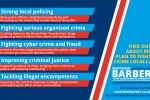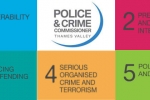Calls to the police 101 non-emergency number to become free by April 2020
From April 2020 calls to the 101 police non-emergency number will be free of charge. At present, callers are charged 15p a time. The Home Secretary has announced that he will invest £5 million a year to fund the service, which receives around 30 million calls each year nationally.
Thames Valley Police’s website has been operating on the Single Online Home platform since July 2018 and the public are already able to contact the force and report crimes online. The Single Online Home (SOH), is being launched in full in the summer to reflect changes in how the public are interacting with the police.
The PCC for Thames Valley has been ensuring that the Force focuses on improving the performance of 101. The time taken to answer calls has been steadily falling since a spike during the football world cup and the heightened terrorist threat. Performance is being closely monitored and additional investment is being made in increasing staff, improving training and upgrading technology to make it easier for the public to get the help they need.
Calls to 999 are always prioritised and continue to be free. In an emergency, always call 999.
A change in the law is needed to tackle illegal encampments
As we enter spring we are also entering the seasons for the increase in unauthorised encampments. It is almost universally the case that the public expectation of action by the police in dealing with illegal traveller encampments is not matched by legislation. The limited powers that the police have, especially when an encampment is on private land, is a frustration to the landowners, local communities and indeed many police officers. I fear it can also damage wider confidence in policing as the public do not necessarily understand the limited powers the police have.
Last year the Government consulted on the powers to tackle unauthorised encampments and it has now indicated it's intention to change the law to give greater powers to the police and local authorities. This is welcomed but the details will need to be scrutinised. There is an indication of some of the areas that will be considered, such as changing the threshold number of vehicles that constitutes an unauthorised encampment and extending the period before anyone can return. The devil will be in the detail however and if meaningful changes are to be brought about it will need changes in the law and a different approach from the police and local authorities.
I have written to all twenty-one of the MPs across Oxfordshire, Berkshire and Buckinghamshire asking them to meet collectively to discuss the problem of unauthorised encampments once the government proposals have been published.
In the meantime Thames Valley Police have made significant progress with local authorities in establishing a joint protocol to better coordinate the response to unauthorised encampments. The lack of transit sites in the Thames Valley is one of the issues that limits the powers that the police have at their disposal and one of the issues that I believe needs to be addressed.
I will continue to encourage the police to do everything they can to use their powers within the existing system in order to limit the harm to communities from unauthorised encampments, but the system is flawed and I welcome the opportunity being offered by the Government to change it.
Read more on my website at www.matthewbarber.co.uk
New local police headquarters secured for Reading
The Police and Crime Commissioner for Thames Valley has announced the purchase of a new Area Headquarters for Reading Local Policing Area (LPA).
The new Area Headquarters will be at Atlantic House, located off Imperial Way to the south of Reading town centre.
Thames Valley Police has been operating from its existing police station in the centre of Reading for 40 years. It has been seeking a new Area Headquarters for Reading LPA since 2012 due to the deterioration of the existing building which has become expensive to run and is much larger than needed for modern policing requirements.
It is also important to us and to the public that Thames Valley Police continues to have a visible presence in the centre of Reading which is accessible to members of the public and a base for neighbourhood policing. In addition to our new Area Headquarters, we will continue to look for a suitable town centre facility to meet these needs to ensure continuity of service.
Tackling County Lines and criminal exploitation
The threat from serious organised crime has never been greater as shown by the National Crime Agency's (NCA's) recent national assessment. The impact of County Lines drugs gangs and criminal exploitation is a threat that Thames Valley Police has been taking incredibly seriously. In a recent week of action alone more than 70 arrests were made and £85,000 seized across 42 separate operations. Click the image to the left to watch just one of those operations being carried out in Banbury.
Collaborating with other Emergency Services
Collaboration makes a real difference in keeping the public safe. Earlier this month I attended the ground breaking ceremony for the new Tri-Service Station at Crowthorne. This is just the latest collaborations between Thames Valley Police and the three Fire and Rescue Services across Berkshire, Buckinghamshire and Oxfordshire.
Once completed the new building will provide a base for Royal Berkshire Fire & Rescue Service, Thames Valley Police and South Central Ambulance Service. Not only is it more cost effective to share premises, but it also fosters the ever closer working relationship between the emergency services.



